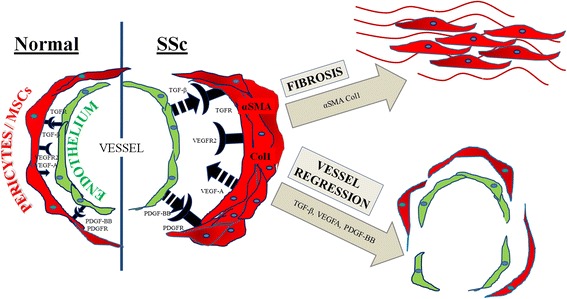Figure 6.

Schematic drawing that illustrates the pathogenic consequences of altered crosstalk between epithelial cells (ECs) and pericytes/mesenchymal stem cells (MSCs) in systemic sclerosis (SSc). In SSc, abnormal EC production of transforming growth factor (TGF)-β and platelet-derived growth factor (PDGF)-BB interacting with their specific receptors, expressed on pericytes/MSCs, may induce myofibroblast differentiation and activation, leading to the fibrotic manifestation of disease. Furthermore, the same molecular imbalance leads on one hand to pericyte proliferation and consequent wall remodeling in arteriolar vessels, on the other to pericyte detachment in capillaries. Furthermore, pericyte hyper-production of vascular endothelial growth factor (VEGF)-A may make ECs unresponsive to the proangiogenic stimuli of the tissue-derived form of VEGF-A. The increased expression of VEGFR2 on pericytes/MSCs may suppress PDGFR signaling through the induction of VEGFR2/PDGFR complexes. This pathway abrogates pericyte coverage and leads to vascular instability and regression. These alterations underlie the main pathogenic aspects of the SSc vasculopathy and the impaired compensatory neo-angiogenesis.
